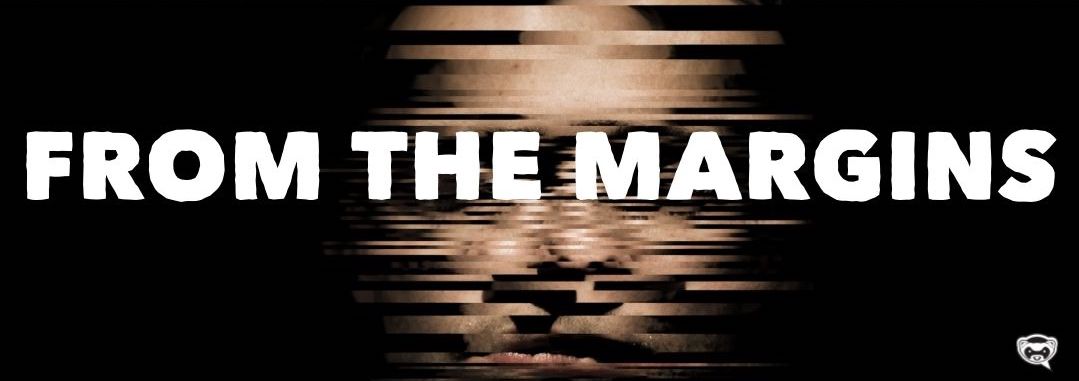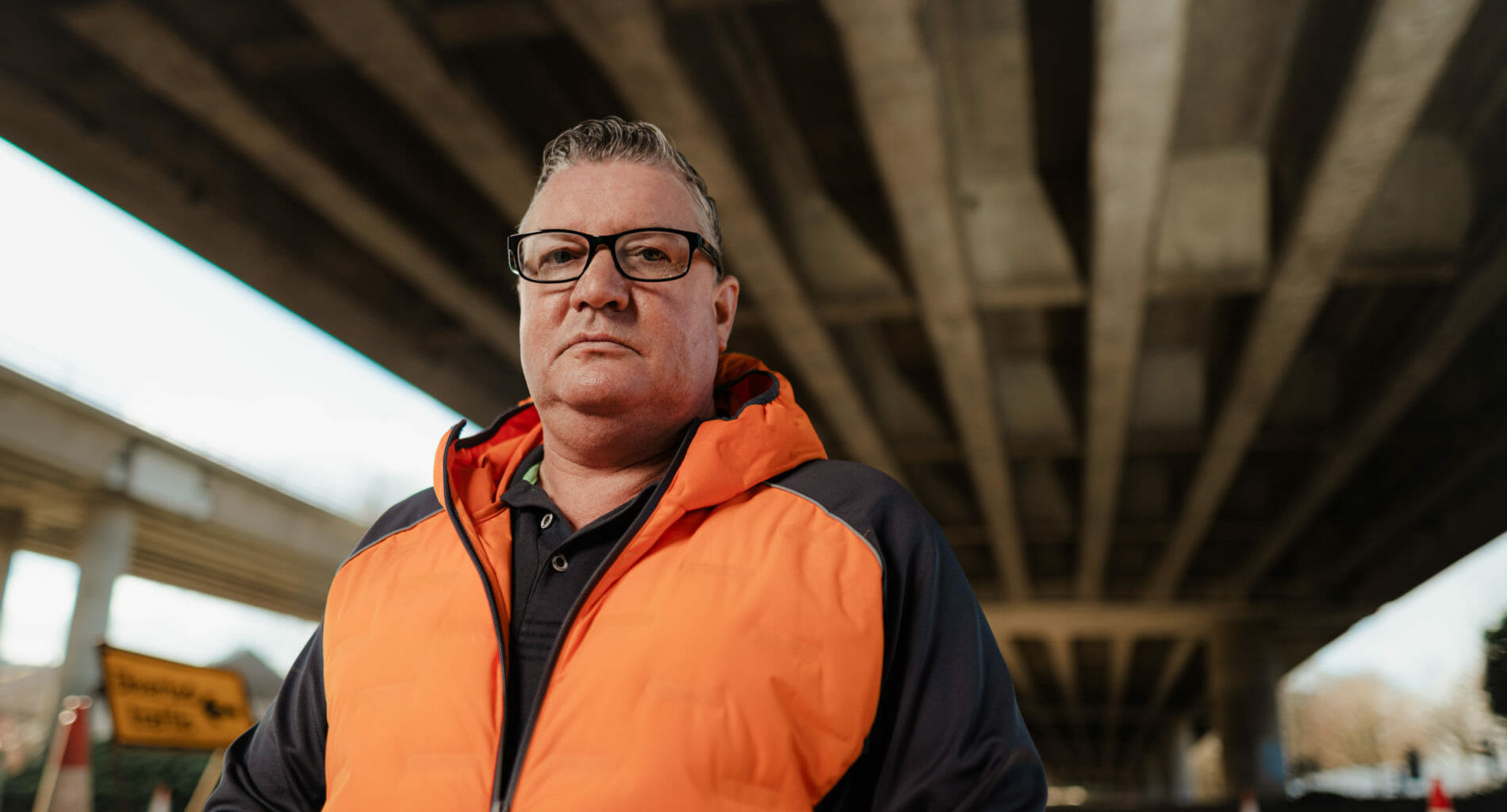
In the Ferret’s From The Margins project, reporter Karin Goodwin works with citizen journalists who have lived experience of overlapping issues including homelessness, addiction and mental health. The series investigates the way these things interact, making it very difficult to break out of a cycle of insecurity. In this piece one of our citizen journalists, Tam, tells his story of the way these linked, structural issues have impacted his life.
Picture this: before you is a drinking glass and it’s half full of resentment, anger, fear, low self-worth, no self-esteem, pride, ego, and self-doubt.
Pour in homelessness, violence, unemployment and family breakdown. Now top it up with drugs and alcohol. That cocktail was once my life.
It’s nothing like that for me any more. I’m five years in recovery. And over the last few months I’ve been working as a citizen journalist for The Ferret’s From the Margins series, trying to tell the stories of others in that position and give them a voice.
In that time, we’ve held meetings to hear directly from dozens of people in Glasgow and Dundee, and they’ve seen the similarities in what they are telling us about the connections between addiction and trauma, mental health, homelessness and violence.
We’re hoping that by showing what they are up against, and the lack of support on offer, that attitudes will change and action will be taken.
Like a lot of the people we’ve met, I had a pretty difficult start. I was born in an overcrowded two-bed flat in Govanhill, the southside of Glasgow, where I lived with my grandparents, mum, brother and uncle.
Growing up we never had much money, so I found my fists and learned how to fight back when people made comments about the way I looked.
But by 12 or 13 I found something else – alcohol. And I was off through my teenage years, mixing it with hash, buzzing gas, getting high on ecstasy and speed, and then coming down with jellies .
That’s something else we found talking to people in this project – drug and alcohol use often starts young.
My family relations broke down and I was put out of the family home aged 17. It was the first time I became homeless. A period of sofa surfing started, an invisible form of homelessness that often isn’t seen in the official figures, even now. Lots of people still don’t understand their rights to housing.
My drug use was escalating and it seemed like a good idea to chuck my job and start dealing. That will be hard for some people to understand but when you’re there, it’s easy to go from using drugs to low level dealing.
What I didn’t see then, if I’m honest, was how I was being used by the older people around me. It brought violence into my life. By my late teens I’d been stabbed, in the head, chest and face for the first time. A few years later, I ended up with a punctured lung. Eventually it was my right kidney. I still suffer the effects today.
I disappeared for the first three months of my son’s life. When I finally asked to see him, I’d been drinking. I don’t blame his mother for driving away with our son.
Tam
Later, my girlfriend got pregnant, but that didn’t sort me out. I disappeared for the first three months of my son’s life. When I finally asked to see him, I’d been drinking. I don’t blame his mother for driving away with our son.
By this time I just couldn’t stay clean or sober, and it’s around this time that I end up with a heroin habit too.
I found myself in early 30s – an intravenous heroin-using, crack pipe smoking alcoholic. I was street homeless in Glasgow city centre – sleeping under the bridges, in bin chutes, in NCP car parks, and behind shops.
My life consisted of waking up from wherever I had skippered (slept rough) the night before, then going around the bus stops, picking up the douts (cigarette ends) for my tobacco for the day.
I’d go and see if I could beg up some money for drink and drugs and then use the drink and drugs. In the evening I’d go to a soup kitchen, to tap (borrow) money off anyone there I knew. Then it would be back to finding a skipper (rough sleeping spot) to get my head down.
Sometimes I did try to get a roof over my head, reporting myself as homeless to the council. But soon I’d done the rounds with all the hostels and got myself barred – it wasn’t difficult when you were living like this, and they had policies like chucking you out for using drugs or alcohol, and coming in after 11pm.
In terms of rough sleeping Glasgow is a very different place now. Since Covid-19, the city council has been meeting its duty to accommodate homeless people. But problems continue with the types of accommodation on offer.
Eventually, I decided I’d had enough, and with the help of the Legal Services Agency, I got a temporary furnished flat. That should have been me sorted, right? But life is not so simple.
When the guy from the housing association was showing me around, the fear kicked in. Back then I had never successfully looked after myself or a flat. I didn’t know that the weird spaceship in the corner was a washing machine – I’d not used one – and I didn’t know how to deal with life without my community of drinkers and drug users on the street.
That’s why when I spoke to Michael, in our BBC From the Margins documentary, who ended up sleeping rough in the city centre of Glasgow when he already had a flat, I didn’t find it difficult to understand what was going on. I’d been there and knew that he’d just found himself back in a place that, as weird as it might sound, felt like home.
At that point in my life I could have entered back into the chaos. But then in 2015 I got a phone call that changed everything.
I had last seen my son when he was just nine. Now he was 17 and on the other end of the phone, asking to meet me. I agreed but I didn’t manage to arrive sober.
While working on this citizen journalism project we heard from young people at Scottish Families Affected by Alcohol and Drugs‘ Routes project in East Dunbartonshire. Their parents are in addiction. Billie, 16, told us that she hates now to hear people make promises.
I went for my son, but I stayed for myself. And I changed in there. I did a 12-step programme, and I got a sponsor. I found it was the basis for making my recovery sustainable.
Tam
I was just like that – making him promises I couldn’t keep.
Those promises went on for a year – the harder I tried to stop, the harder it seemed to get. I was on methadone and other prescription drugs for my mental health, but it wasn’t enough.
So I approached my community addiction team and begged for help. My worker got me first into the Kershaw unit (an alcohol detox unit) in Gartnavel hospital, then into a six-month drug rehabilitation centre on 23 November 2016. My son dropped me off at the front doors with £40 and two pouches of tobacco, and begged me not to walk out.
I went for my son, but I stayed for myself. And I changed in there. I did a 12-step programme (recovery for addicts/alcoholics), and I got a sponsor. I found it was the basis for making my recovery sustainable.
Even when I left there were challenges. I was homeless and put in a hostel again, sharing with a guy who was actively using drugs and alcohol. As someone just out of rehab it felt like an impossible place to be.
But Shelter Scotland fought for my legal housing/homeless rights and got me into a suitable abstinence-based supported accommodation. During that time I did a day programme – Second Chance – and started volunteering with organisations like Shelter, food waste charity Fare Share and mentoring organisation, Elevate.
My first year out of rehab was like a whirlwind. There were interviews with the media about my story, and training videos for Shelter’s law service. My son was proud of me again, my mum came up from London, and we started to build bridges.
The icing on the cake must be early 2018 when my mentor at Shelter, Stephen Wishart, said we were being invited to the Queen’s Garden party at Holyrood Palace on the 4 July. Standing there with our kilts on, I had to pinch myself. It was a long way from what I came from to this.
That’s the message I’d like to put out there to people who watch the From the Margins documentary, or read the articles in The Ferret. You might see someone whose life right now doesn’t look like yours. But everybody matters. And lives can change when people get the right support.
And it turned out I wasn’t a waste of space after all. I continued volunteering, got a job in a kitchen and saved up to take my mum to Paris for her 70th birthday – the Eiffel tower, a cruise on the Seine, the Louvre, the whole bit.
In September 2020 I got a job for Shelter’s Time for Change Glasgow team and now I’m learning housing law and doing an SVQ3 in health and social care. I go on holidays and I’m learning to enjoy my life.
That glass in front of me is full of different things now. I would never deny my past – those experiences are part of me. But now it’s a mix of friendship, family and employment. I would say I am now considerate, confident and trustworthy.
And most of all there is love. That’s what gets you out. I am loved and most importantly, I’ve learned to love myself.
Photo credit: Laura Kingwell/BBC














